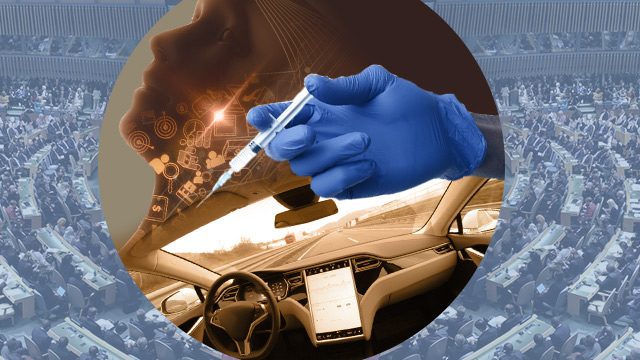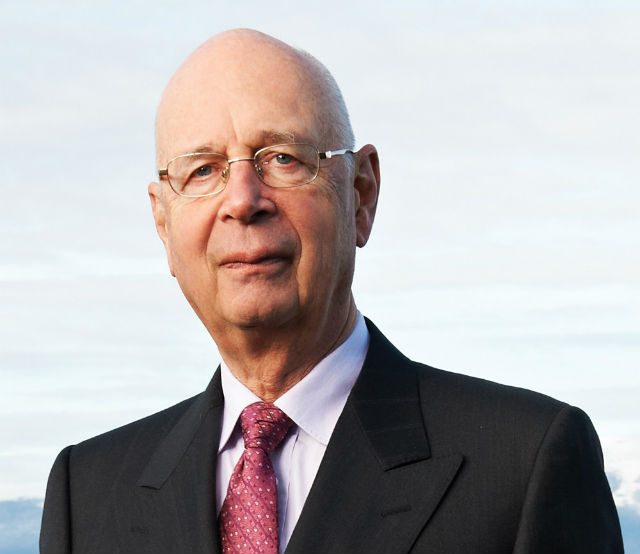SUMMARY
This is AI generated summarization, which may have errors. For context, always refer to the full article.


We need a new framework for global cooperation in order to preserve peace and accelerate sustainable progress. After the Second World War, leaders from across the globe came together to design a new set of institutional structures to enable the post-war world to collaborate towards building a shared future. The world has changed, and as a matter of urgency, we must undertake this process again.
This time, however, the change is not merely geopolitical, nor economic. Rather, we are experiencing a change to the very fabric of how individuals and society relate to one another and to the world at large. We are living in the age of the 4th Industrial Revolution (4IR). Economies, businesses, societies, and politics are not just changing – they are fundamentally transforming. Reforming our existing processes and institutions will not be enough. Rather, we need to redesign them to anticipate the forces of change and shape strategies that leverage the abundance of new opportunities, while avoiding the great risks inherent in such disruptive periods. If we wait, or just apply a “quick fix” to repair the deficiencies of outdated systems, the forces of change will naturally develop their own momentum and rules, and thus limit our ability to shape a positive trajectory and outcome. We need a new framework for global cooperation in order to preserve peace and accelerate sustainable progress. After the Second World War, leaders from across the globe came together to design a new set of institutional structures to enable the post-war world to collaborate towards building a shared future. The world has changed, and as a matter of urgency, we must undertake this process again.
To start, we have to understand the transformative force of the 4th Industrial Revolution. What was considered science fiction only a few years ago has become today’s reality. Its impact is comprehensive and all-encompassing. The innovative force of the 4IR redefines the whole system of how we produce, consume, and communicate.
We can describe the 4IR in terms of evolving technologies, such as AI, precision medicine, autonomous vehicles, and more. However, to truly understand its transformative power, we must define the basic 5 characteristics of the 4IR:
- Digitization: Everything is expressed in terms of data, leading to an economy of unlimited mobility.
- Integration: Data becomes integrated into platforms, thereby disintermediating economic interactions.
- Smart-ization: Artificial Intelligence transforms data platforms into intelligent systems, which will impact all aspects of life.
- Virtualization: Platforms and systems migrate to the cloud, with cyberspace serving as the catalytic enabler.
- Designation: Systems move from being just analytical to becoming predictive and prescriptive, creating the need for clear ethical rules and guidelines.
The impact of the 4IR on our economic, social, and political systems will be truly transformative. The physical world will shrink in comparison to a new interconnected digital world. This de-materialization of the economy will be accelerated by a transition into a circular and a shared economy, enabled by the 4IR. Manufacturing will be revolutionized by automation, localization, and customization, replacing traditional supply chains.
Employment and income patterns will be transformed as large parts of employment are substituted by intelligent automation. Traditional labor income will be extensively replaced by accrued returns from creative tasks, venture capital, and first-mover advantage. This will require reformation of the tax systems.
Our whole system of education will have to be revamped. The age of the 4IR requires new skills and abilities as well as life-long learning. Emphasis must be placed on nourishing creativity, critical thinking and new digital skills, and above all, on supporting the very aspects that make us human. Cultivating empathy, sensitivity, collaboration, and passion are the best way to ensure that we use technology as a tool for mastering our lives and do not become the slaves of algorithms.
Policy making will have to cope with the speed of change to ensure societally-oriented and human-centered progress. The danger here is that a two-speed 4IR transformation could unfold, with government policies continuously lagging behind. New collaborative, agile governance models will have to be developed.
The speed, complexity, and virtual nature of change however makes it difficult to understand the urgent need for agile policy formulation. This is exacerbated by the widening gap between the “winners and losers” of the 4IR, which is undermining social and national cohesion and reinforcing the notion of “winner takes all.”
The timely answer to all these questions will determine the economic relevance and growth of each country. It will also determine welfare and job opportunities for its citizens. It will shape its standing and power in the geoeconomic and geopolitical arena. Ultimately, it will determine the quality of life for the generations to come.
Governments and societies have 3 basic options:
- Protect those who have been left behind from the transformative changes brought by the 4IR, thereby gaining short-term political advantage, but ultimately setting the stage for the erosion of competitiveness.
- Follow a laissez-faire policy, which requires the business community to be ready and able to serve as a strong catalyst and mover.
- Mobilize all forces to fully embrace the 4IR and achieve a leadership position, recognizing that the principle of the future global economy will no longer reflect Adam Smith’s division of comparative advantages, but rather a world characterized by a complex interplay between platforms and systems that cross national boundaries.
Having gained from the forces of the first Industrial Revolution, the United Kingdom became the dominant global power, followed by the United States, which built its global influence by taking ownership in the 2nd and 3rd Industrial Revolutions. These 3 Industrial Revolutions divided the world into industrialized and developing nations.
Today, the global landscape is again being redistributed – and at incredible speed. We are in a global competition for leadership of the 4IR, providing the base for future economic and political power.
Faced with the reality of fundamental power competition, the global community has much more at stake than addressing the current trade wars. Patchwork actions are not the solution to reinvigorating outdated systems and revitalizing organizations to make them fit-for-purpose. The context has changed, and we need fresh thinking about what free and fair economic relations in today’s world means. (READ: New industrial revolution to usher in age of Pinoy micro-entrepreneurs)
There is an urgent need for a global dialogue on 10 key issues which will drive globalization 4.0:
- Global dialogue on economic cooperation: Creating a new framework of rules and institutions, which integrates all aspects of global economic cooperation, including intellectual property, movement of people, competition policies, data protection, exchange rates, fiscal policies, state-owned enterprises, and national security.
- Global dialogue on technology policy: A common and collaborative effort to define the principles for new and emerging technologies, such as AI and gene editing, to ensure that they are underpinned by the necessary ethical principles and values-based framework.
- Global dialogue on cybersecurity: A collective and coordinated effort to ensure that innovation and the technological backbone of the 4IR are secure and trusted.
- Global dialogue on financial and monetary systems: Jointly shaping our monetary and financial systems by leveraging new technologies, such as crypto currencies and blockchain, as well as making the systems more resilient for achieving sustainable growth and long-term societal well-being.
- Global dialogue on economic policy decisions: Redefining our present economic theories to better reflect the structural changes inherent in the 4IR, such as the changing notion of productivity.
- Global dialogue on risk resilience: Improving our collective management of the key environmental systems (climate, ocean and biosphere), upon which our societies and economies depend will be paramount for the future of our planet.
- Global dialogue on human capital: As the skills required to remain competitive in the 4IR are continuously evolving, we need a global brainstorming on the future of work and the role of human capital.
- Global dialogue on a new societal narrative: We need to shape a new narrative for societies – moving from a materialistic fixation to a more idealistic, humanistic focus. Similarly, it also calls for shifting away from producing and consuming and moving towards caring and sharing.
- Global dialogue on industry systems: The 4IR provides us with the great opportunity to substantially enhance the availability and delivery of services in the areas of health, energy, communication, transportation, and more.
- Global dialogue on institutional reform: We need to rethink our global institutional frameworks, which were created over 70 years ago, and adapt them to ensure they are relevant for the new political, economic, and social context.
All of these dialogues must be integrated into a comprehensive framework which reflects the interconnectivity of politics, economics, technology, and society. For each of these issues, we must not just focus on reforms, but also on what is needed to adapt to the new reality.
The following 3 principles should lead such dialogues:
- The dialogues must be multistakeholder-based, necessitating that governments, business, and civil society work together in collaborative and agile ways. Governments have a key leadership role to play, with business serving as the driver of innovation, and civil society acting as the custodian for a human-centered application of innovation. (READ: Governments grapple with globalization backlash)
- The forces of the previous industrial age have largely determined economic progress and saw open markets as the primary means for creating welfare in industrialized and developing countries. As the structure of income generation and wealth distribution is transformed in the 4IR, the preservation of social coherence and national cohesion has become paramount. Striking a balance between sustaining national social contracts while preserving an open world, will be an important guiding principle for the new concept of globalization 4.0.
- In a world which has become more complex, multipolar, and multiconceptual, the ability to manage global collaboration may be increasingly based on coordination and less on cooperation. Coordination implies a means of achieving the same objectives while providing freedom for different national views, concepts, and value systems. The Paris Climate Agreement and the United Nations Sustainable Development Goals provide a good example of such a coordinated approach, particularly in a world where cohabitation is less based on shared values and more on shared interests.
To start such a comprehensive dialogue and develop a new framework for global cooperation is the objective of the World Economic Forum, and particularly of the Annual Meeting 2019 in Davos. As the foremost global multistakeholder platform, and the recognized International Organization for Public-Private Cooperation, the Forum can act as a catalyst and a platform for – Globalization 4.0: Shaping a Global Architecture in the Age of the 4th Industrial Revolution.
After the Second World War, leaders from all sectors of society came together to help create the global frameworks needed for living together in an environment of continuous peace, security, and prosperity. They designed the organizations and institutional processes that would work together to achieve this. Since that time, however, the world has radically changed. A new approach is now called for, one where – together – we shape our global future through our sustained commitment to improve the state of the world. – Rappler.com
Klaus Schwab is founder and executive chairman of the World Economic Forum.
Add a comment
How does this make you feel?
There are no comments yet. Add your comment to start the conversation.